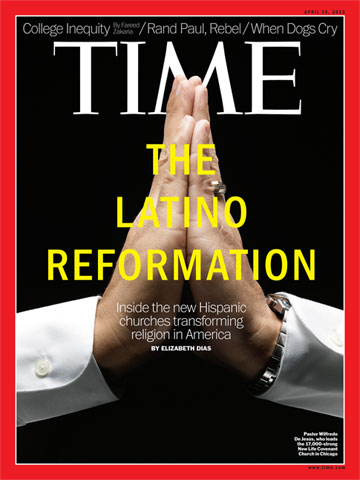
(3 of 7)
Just 10 minutes away from el calvario is Iglesia Roca de la Eternidad--Rock of Eternity Assemblies of God Church. Some 700 people attend one of its three services each week. Flags from their home countries--El Salvador, Guatemala, Honduras, Ecuador, Nicaragua, Costa Rica, Panama, Mexico, Colombia--line the meeting hall. At least half the congregation, Pastor Heber David Paredes estimates, are Catholic converts. Even more may be undocumented, he says, and about a third have trouble reading and writing in English. They call one another hermana, hermano--sister, brother. "Church is what they have," says Paredes, who is from Guatemala. "They don't have many places where they can feel welcome. That's what they are looking for. That's where they have a family, a place to belong."
La Roca is part of a revolution. Catholic Latin America experienced the first inklings of the 16th century European Protestant Reformation only in the 1970s and '80s, thanks largely to evangelistic Pentecostal television and radio programs. Catholics were 81% of Latin America's population in 1996, while Protestants made up only 4%, according to Latinobarómetro, a Chilean polling group. By 2010, Protestants had jumped to 13% of the population, while the percentage of Catholics dropped to 70%. Says Samuel Rodriguez, president of the National Hispanic Christian Leadership Conference in Sacramento: "We are in the first generation of the Hispanic Protestant Reformation."
Latinos are turning not just to Protestantism but to its evangelical strain for a variety of reasons. Above all, Latinos who convert say they want to know God personally, without a priest as a middleman. More than 35% of Hispanics in America call themselves born-again, according to the Pew Forum, and 9 out of 10 evangélicos say a spiritual search drove their conversion. "People are looking for a real experience with God," says Paredes. That direct experience comes largely from exploring the Bible. "We do the best to preach with the Bible open. When they read the Bible, they find a lot of things they didn't know before. They may have had religion, but they did not have an experience."
Among evangélicos, worship is adaptable and open to self-expression. You want to pray aloud in your pew? Do it at the top of your voice, even when the pastor is praying. Want to fall to your knees? Run to the altar. Sing in Spanish and switch to English at Verse 3? Go for it. "The evangelical church says this: Listen, you want to come to our church? If you are Mexican, we will show you a church where you can sing mariachi music," explains Rodriguez. "If you are Puerto Rican, we will have salsa. If you are Dominican, we will have merengue. If you are Colombian, we will have cumbia."
Like an earlier generation of immigrants from Europe, Latino Christians often see Protestantism as the path to a more genuine, more prosperous "American" life. "They see the move to Protestantism, particularly evangelicalism, as a form of upward mobility, and very often I think they associate Catholicism with what they left behind in Latin America," says Randall Balmer, the chair of Dartmouth's religion department. "They want to start anew."
